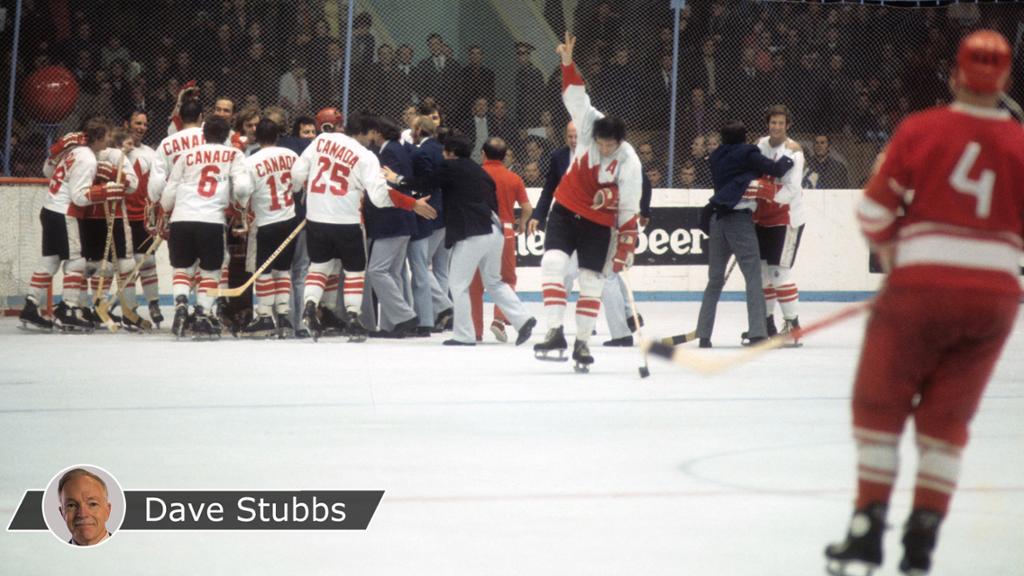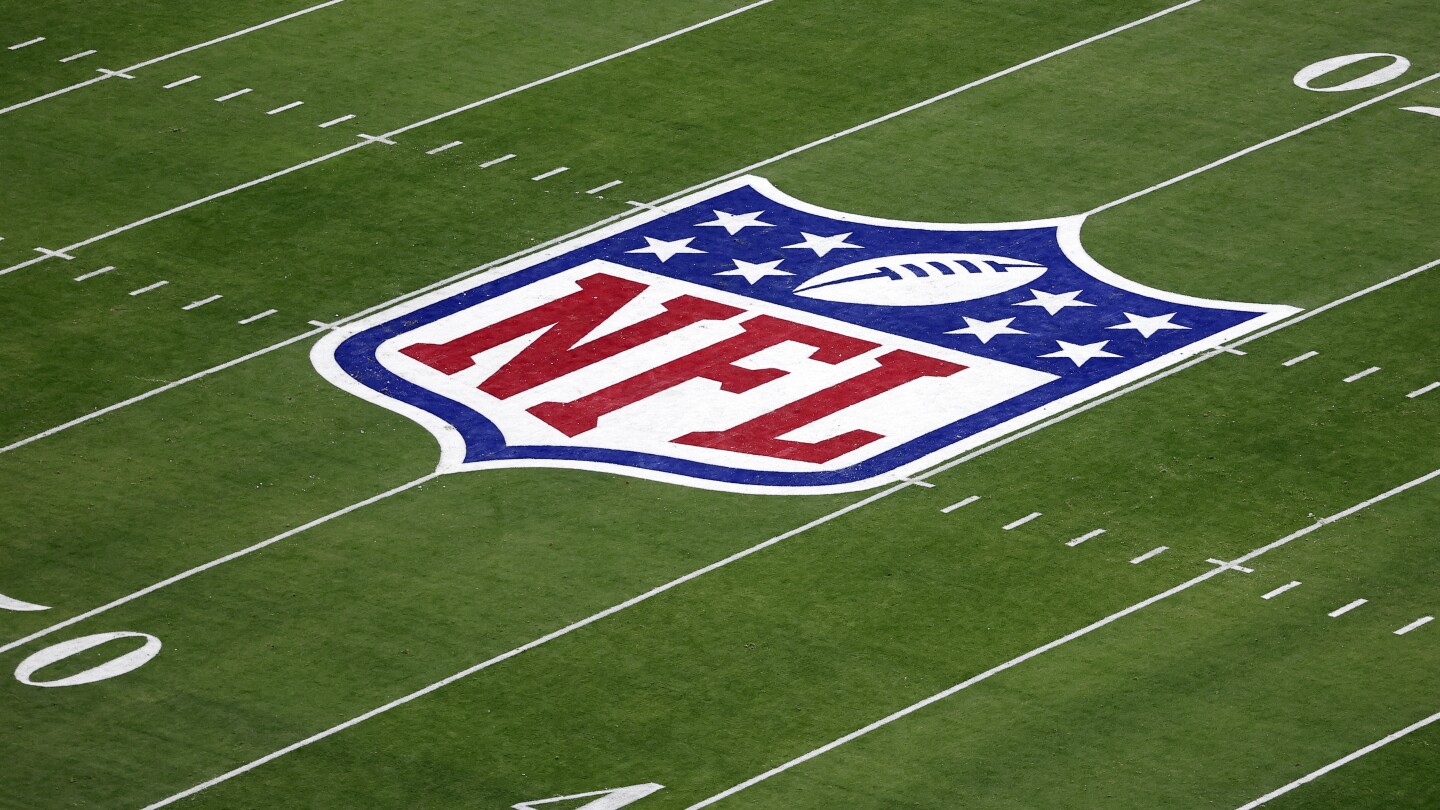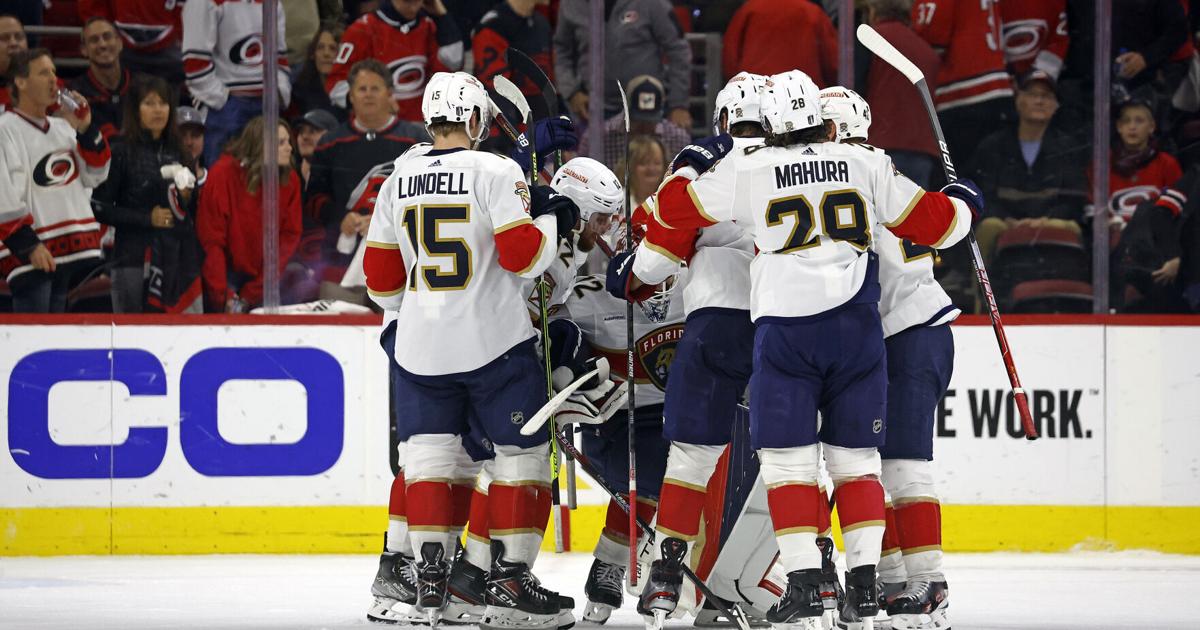Sports
Dryden reflects on how Summit Series changed hockey 50 years later
Published
2 years agoon

Ken Dryden views the importance of the eight-game 1972 Summit Series between Canada and the Soviet Union above all else in hockey, ever.
“That series clearly and undeniably is the most important moment in hockey’s history. Not Canadian hockey history, but in hockey’s history,” the Hall of Fame goalie told NHL.com on Thursday on the eve of the 50th anniversary of Game 1, a stunning 7-3 romp for the Soviets at the Montreal Forum on Sept. 2, 1972.
“Up until that moment, hockey was definitively a Canadian game,” Dryden said. “We were the originators of hockey, the developers, the world’s best at it. Our way was the hockey way.
“Others could play differently but that was their fault. Different meant inferior. Different is interesting, but if different is inferior, who cares? In that series, the Soviet team showed there is another way to play and another way to prepare to play.”
Late photographer Denis Brodeur, Martin’s father, shot a legendary sequence of photos capturing the Summit Series-clinching goal of Paul Henderson (right). Denis Brodeur collection/Melchior DiGiacomo, Getty Images
The Soviets had defeated a team of Canadian amateurs 5-0 at the 1968 Olympics in Grenoble, France, on their way to the gold medal. Canada won the bronze, leading bombastic Soviet coach Anatoli Tarasov to brag that his team could beat the best the NHL could throw at him. Hockey Canada accepted the challenge, negotiating with the Soviets through NHL Players’ Association president and player agent Alan Eagleson to set up an eight-game series to be played in September 1972.
Canada would rebound from its Game 1 humiliation with a 4-1 victory in Game 2 in Toronto two nights later. The teams then tied 4-4 in Game 3 in Winnipeg on Sept. 6 before the Soviets won 5-3 in Game 4 in Vancouver on Sept. 8.
With that Game 4 loss, a good deal of Canada on the backs of the team, Phil Esposito emptied his heart on live television after the game:
“To the people across Canada, we tried, we gave it our best,” he said. “And to the people that boo us, geez, I’m really… all of us guys are really disheartened, and we’re disillusioned, and we’re disappointed at some of the people. … If the Russians boo their players, then I’ll come back and apologize to each one of the Canadians but I don’t think they will.”
Esposito went on, saying the team suited up for love of country, not money. And at that point, a nation realized that these players truly cared about what they had signed on for.
Ken Dryden prepares for a shot by the Soviet Union’s Boris Mikhailov with Alexander Yakushev standing by, Canadian defenseman Gary Bergman at right. Melchior DiGiacomo, Getty Images
Back home in Moscow, the hosts won 5-4 in Game 5 on Sept. 22 to set the stage for Canada’s backs-to-the-wall rally and three straight wins — 3-2, 4-3 and 6-5 from Sept. 24-28 — to win the series 4-3-1. Paul Henderson scored the winner in each of the final three victories, becoming a national icon in the process.
“It’s the most vivid, meaningful hockey experience that I have had,” said Dryden, author of the new book “The Series: What I Remember, What It Felt Like, What It Feels Like Now.”
“If you asked every player on Team Canada, I think they’d say the same. We were on lots of Stanley Cup-winning teams. Even if on those teams we would have played different kinds of roles, that’s how we feel. You can’t anticipate how you’re going to feel. You can’t orchestrate how you’re going to feel. You can’t force yourself to feel a certain way. You feel as you feel. That’s what has happened.
“I think the odd thing, which is really interesting and really revealing, is that I think almost all the players on the Soviet team would say the same thing. They won all kinds of world championships and Olympic gold medals, and they didn’t win this series.”
Phil Esposito argues with an official during a game in Moscow, Canada’s Brad Park at left, the Soviet Union’s Alex Ragulin at right. Melchior DiGiacomo, Getty Images
Dryden was the most dominant goalie in the NHL in the 1970s, a brilliant performer for the Montreal Canadiens. He won the Stanley Cup six times, the Vezina Trophy as the top goalie in the NHL five times, and the 1971-72 Calder Trophy as NHL rookie of the year after he’d won the Conn Smythe Trophy as MVP of the postseason.
Elected to the Hockey Hall of Fame in 1983, Dryden was voted among the 100 Greatest NHL Players in 2017 for the League’s centennial celebration.
But all of these achievements are filed behind his experience with Team Canada in the Summit Series.
A half-century later, those eight games remain a defining moment of the game — for the vastly different style of play, for the dramatic Cold War politics of the day, for a series that was anything but the walk-over predicted for Canada.
Through the years, there have been World Championship, Olympic Games, Canada Cup and World Cup tournaments and various tours and one-off games between NHL teams and squads from the former Soviet Union. But no series has had the importance of the Summit Series, and no other has pitted political ideologies against each other or reshaped the very way hockey is played.
The Soviet Union’s Valeri Kharlamov leads his team through warmups at the Montreal Forum before Game 1 on Sept. 2, 1972. Melchior DiGiacomo, Getty Images
“The way the Soviets played just opened minds,” Dryden said. “It took a while for those minds to open fully, but after that series, people did start to think about the training a different way — off-ice training and the value of that. Of on-ice training, where a pass fits in and the patterns in which you play. Once there’s a second way to play, there’s a second way, a fifth way, a 10th way.
“Players start to imagine different ways to do things and conceiving of them and practicing them and making them happen. And coaches do the same. That all is the legacy of that series.”
It began with the largely unknown Soviets, laughed at for their mismatched equipment, demolishing Canada in Game 1.
The opener began predictably enough, the hosts up 1-0 after 30 seconds on a goal by Esposito, up 2-0 by 6:32 on a goal by Henderson.
Soviet Union goalie Vladislav Tretiak watches Game 1 action through the fog of a steamy night at the Montreal Forum. Melchior DiGiacomo, Getty Images
But the superior conditioning of the Soviets soon was evident; they scored twice on Dryden before the first period was over, once shorthanded, then twice more in the second. A goal by Canada’s Bobby Clarke at 8:22 of the third on Soviet goalie Vladislav Tretiak offered a flicker of hope, but the Soviets then scored three unanswered goals in a span of 5:05 to make the embarrassment complete.
Defenseman Pat Stapleton, a member of Team Canada, tirelessly promoted the series, its historic significance and its legacy — in schools, with passers-by in the street and everywhere in between — until his death in 2020.
In 2016, sitting in the Montreal Forum, the hockey rink dismantled 20 years earlier with the building’s renovation following the Canadiens’ move to Bell Centre, Stapleton thought back to 1972 and remembered the shell-shock of Game 1.
“We got on the bus after the game, and I was sitting at the window when Ken (Dryden) sat down beside me,” he recalled. “He turned to me and said, ‘What happened?’ and I remember saying, ‘I think we lost our composure.’”
Sitting almost wordlessly bound for the airport and their flight to Toronto for Game 2, little did Stapleton or Dryden know that Canada, as a nation, was having a nervous breakdown.
The 35-member Team Canada as assembled in Toronto for their August 1972 training camp. Bottom row, from left: Tony Esposito, Brad Park, Stan Mikita, Phil Esposito, coach Harry Sinden, organizer Alan Eagleson, assistant coach John Ferguson, Frank Mahovlich, Jean Ratelle, Bobby Orr, Ken Dryden. Second row, from left: executive Bob Haggert, Dennis Hull, Mickey Redmond, Paul Henderson, Red Berenson, Wayne Cashman, Vic Hadfield, Ed Johnston, Bill Goldsworthy, Ron Ellis, Rod Gilbert, executive Mike Cannon. Third row, from left: trainer Joe Sgro, Yvan Cournoyer, Gary Bergman, Dale Tallon, Bill White, Peter Mahovlich, Serge Savard, Jocelyn Guevremont, Gilbert Perreault, Pat Stapleton, trainer Frosty Forristall. Top row, from left: massage therapist Karl Elieff, Marcel Dionne, Bobby Clarke, Don Awrey, Brian Glennie, Rod Seiling, Guy Lapointe, Richard Martin, Jean-Paul Parise, equipment manager Tommy Naylor. MacDonald Stewart/Hockey Hall of Fame
“The game we want to forget,” Team Canada defenseman Serge Savard said with a tight grin. “The game we don’t want to talk about.”
If this series made Henderson a national icon for his winning goals in Games 6, 7 and 8, it was about much more than one man’s heroics. This was about two teams going at each other with hammer and sickle and tong, with Canada winning on Henderson’s dramatic goal with 34 seconds remaining in Game 8 on Sept. 28, 1972.
Sixteen million of 22 million Canadians watched the final game, scratchy television coverage beginning at 12:30 p.m. ET. Between 9:30 a.m. on the West Coast and 2 p.m. in Newfoundland, the huge majority of Canadians were gathered around TV sets at work and in classrooms, a country holding its collective breath.
A dozen or more books have been published in English about the Summit Series, many more including those in French and Russian. There have been scholarly theses written and documentaries produced; the latest of the latter is a film titled “Summit 72” that will premiere on CBC in Canada on Sept. 14, running in one-hour segments on four consecutive Wednesdays.
The new book by Dryden, a 75-year-old educator, lecturer and award-winning author, is one of a handful published for the 50th anniversary, his a deeply personal at-the-moment view of the series.
Savard, who with Larry Robinson and Guy Lapointe made up the Canadiens’ “Big Three” on defense in front of Dryden during the 1970s, views the Summit Series as much more than 480 minutes of hockey.
The Canadian and Soviet teams shake hands after Game 8 in Moscow. Among the players here are goalies Ken Dryden (second from right) and Vladislav Tretiak (20). Melchior DiGiacomo, Getty Images
“It became a political series, and that wasn’t our fault. We didn’t want that,” Savard has said of the players. “The Russians were leading the series when we went over there and those guys wanted to show the world that their way of doing things was the right way, that their way of training was the best, that they had the best athletes in the world.
“All of a sudden, we woke up and said, ‘Hey, we invented this game, not you guys.’ Yet (Soviet leader Leonid) Brezhnev was sitting behind the net in one corner. It was political and we were caught in the middle of it.”
Political realities of the day have doused international reunion plans, no members of the Soviet team coming to Canada to mark the half-century anniversary with members of Team Canada. But Dryden expects that they too will remember a series for the ages.
“In the end,” Dryden said, “it has had the effect that it has on the both of us because of the intensity of it and the difficulty and hardness of it. In the end, neither of us got what we wanted and both of us got what we needed.
“We wanted to win the series in eight straight games and by big scores. We needed to win the series. They wanted to win the series. They needed to show that they could play, in their way, a different way, at the top. They got that, and we got what we needed. I think they’re really proud of themselves for doing that and I think we’re proud of ourselves for doing what we needed to do.”

Latest
NFL must pay $4.7 billion in damages in ‘Sunday Ticket’ case, jury rules
Published
4 weeks agoon
June 27, 2024
LOS ANGELES (AP) — A jury in U.S. District Court ordered the NFL to pay nearly $4.8 billion in damages Thursday after ruling that the league violated antitrust laws in distributing out-of-market Sunday afternoon games on a premium subscription service.
The jury awarded $4.7 billion in damages to the residential class and $96 million in damages to the commercial class. Since damages can be tripled under federal antitrust laws, the NFL could end up being liable for $14.39 billion.
The lawsuit covered 2.4 million residential subscribers and 48,000 businesses in the United States who paid for the package of out-of-market games from the 2011 through 2022 seasons on DirecTV. The lawsuit claimed the league broke antitrust laws by selling its package of Sunday games at an inflated price. The subscribers also say the league restricted competition by offering “Sunday Ticket” only on a satellite provider.
The NFL said it would appeal the verdict. That appeal would go to the 9th Circuit Court of Appeals and then possibly the Supreme Court.
Should the NFL end up paying damages, it could cost each of the 32 teams approximately $449.6 million.
“We are disappointed with the jury’s verdict today in the NFL Sunday Ticket class action lawsuit,” the league said in a statement. “We continue to believe that our media distribution strategy, which features all NFL games broadcast on free over-the-air television in the markets of the participating teams and national distribution of our most popular games, supplemented by many additional choices including RedZone, Sunday Ticket and NFL+, is by far the most fan friendly distribution model in all of sports and entertainment.
“We will certainly contest this decision as we believe that the class action claims in this case are baseless and without merit.”
The trial lasted three weeks and featured testimony from NFL Commissioner Roger Goodell and Dallas Cowboys owner Jerry Jones.
“Justice was done. The verdict upholds protection for the consumers in our class. It was a great day for consumers,” plaintiffs attorney Bill Carmody said.
During his closing remarks, Carmody showed an April, 2017, NFL memo that showed the league was exploring a world without “Sunday Ticket” in 2017, where cable channels would air Sunday afternoon out-of-market games not shown on Fox or CBS.
The jury of five men and three women deliberated for nearly five hours before reaching its decision.
Judge Philip S. Gutierrez is scheduled to hear post-trial motions on July 31, including the NFL’s request to have him rule in favor of the league because the judge determined the plaintiffs did not prove their case.
Payment of damages, any changes to the “Sunday Ticket” package and/or the ways the NFL carries its Sunday afternoon games would be stayed until all appeals have been concluded.
The league maintained it had the right to sell “Sunday Ticket” under its antitrust exemption for broadcasting. The plaintiffs said that only covers over-the-air broadcasts and not pay TV.
Other professional sports leagues were also keeping an eye on this case since they also offer out-of-market packages. A major difference though is that MLB, the NBA and the NHL market their packages on multiple distributors and share in the revenue per subscriber instead of receiving an outright rights fee.
DirecTV had “Sunday Ticket” from its inception in 1994 through 2022. The league signed a seven-year deal with Google’s YouTube TV that began with the 2023 season.
The lawsuit was originally filed in 2015 by the Mucky Duck sports bar in San Francisco but was dismissed in 2017. Two years later, the 9th Circuit, which has jurisdiction over California and eight other states, reinstated the case. Gutierrez ruled last year the case could proceed as a class action.
___
AP NFL: https://apnews.com/hub/nfl
Latest
US Olympic and other teams will bring their own AC units to Paris
Published
1 month agoon
June 22, 2024
EUGENE, Ore. (AP) — The U.S. Olympic team is one of a handful that will supply air conditioners for their athletes at the Paris Games in a move that undercuts organizers’ plans to cut carbon emissions.
U.S. Olympic and Paralympic CEO Sarah Hirshland said Friday that while the U.S. team appreciates efforts aimed at sustainability, the federation would be supplying AC units for what is typically the largest contingent of athletes at the Summer Games.
“As you can imagine, this is a period of time in which consistency and predictability is critical for Team USA’s performance,” Hirshland said. “In our conversations with athletes, this was a very high priority and something that the athletes felt was a critical component in their performance capability.”
The Washington Post reported earlier this month that Germany, Australia, Italy, Canada and Britain were among the other countries with plans to bring air conditioners to France.
Olympic organizers have touted plans to cool rooms in the Athletes Village, which will house more than 15,000 Olympians and sports officials over the course of the games, using a system of cooling pipes underneath the floors.
The average high in Paris on Aug. 1 is 26 degrees Celsius (79 degrees Fahrenheit). The objective is to keep the rooms between 23-26 degrees (73-79 degrees Fahrenheit). The rooms will also be equipped with fans.
“I want the Paris Games to be exemplary from an environmental point of view,” Paris mayor Anne Hidalgo has said about the plans for the Olympics.
According to the International Energy Agency, fewer than 1 in 10 households in Europe has air conditioning, and the numbers in Paris are lower than that. The study said that of the 1.6 billion AC units in use across the globe in 2016, more than half were in China (570 million) and the United States (375 million). The entire European Union had around 100 million.
The Olympics mark the most important stop on the athletic careers of the 10,500-plus athletes who will descend on Paris, which has led some high-profile countries to undercut environmental efforts for the sake of comfort.
“It’s a high-performance environment,” Australian Olympic Committee spokesman Strath Gordon explained to The Post.
___
AP Summer Olympics: https://apnews.com/hub/2024-paris-olympic-games
Latest
Panthers outlast Hurricanes in 4th OT in 6th-longest game in NHL history
Published
1 year agoon
May 19, 2023
RALEIGH, N.C. (AP) — The Carolina Hurricanes and Florida Panthers seemed determined to keep playing. And playing. And playing.
The teams opened their Eastern Conference final playoff series with Florida’s 3-2 victory in four overtimes early Friday, with the game ranking as the sixth-longest game in NHL history.
Matthew Tkachuk’s goal came at the 19:47 mark of the fourth OT to end this one, which marked the 15th four-overtime game in NHL history and the longest game in franchise history for each team.
The longest game in NHL history came on March 24, 1936, when the Detroit Red Wings beat the Montreal Maroons 1-0 in the sixth overtime on Mud Bruneteau’s goal at 116 minutes, 30 seconds of extra play.
Florida’s previous record for longest game was 104:31 in Game 4 of the 1996 Stanley Cup final against Colorado. Carolina’s previous record was 114:47 for Game 3 of the 2002 Stanley Cup final.
The only good news for the teams is they had an extended break before this series began. Carolina closed out New Jersey exactly a week earlier, while Florida eliminated Toronto a day later.
But this game ended roughly six hours after Thursday night’s puck drop, and the teams have a Game 2 in less than 48 hours.
___
AP NHL playoffs: https://apnews.com/hub/stanley-cup and https://twitter.com/AP_Sports







